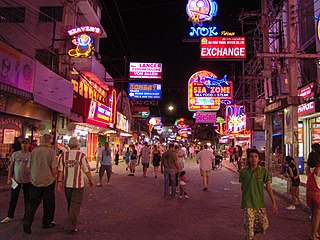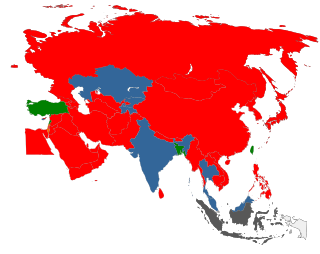
Sexual slavery and sexual exploitation is an attachment of any ownership right over one or more people with the intent of coercing or otherwise forcing them to engage in sexual activities. This includes forced labor that results in sexual activity, forced marriage and sex trafficking, such as the sexual trafficking of children.

A massage parlor, or massage parlour, is a place where massage services are provided. Some massage parlors are front organizations for prostitution and the term "massage parlor" has also become a euphemism for a brothel.

Prostitution in Thailand is illegal. However, due to police corruption and an economic reliance on prostitution dating back to the Vietnam War, it remains a significant presence in the country. It results from poverty, low levels of education and a lack of employment in rural areas. Prostitutes mostly come from the northeastern (Isan) region of Thailand, from ethnic minorities or from neighbouring countries, especially Cambodia, Myanmar, and Laos. UNAIDS in 2019 estimated the total population of sex workers in Thailand to be 43,000.

Commercial sexual exploitation of children (CSEC) is a commercial transaction that involves the sexual exploitation of a minor, or person under the age of consent. CSEC involves a range of abuses, including but not limited to: the, child pornography, stripping, erotic massage, phone sex lines, internet-based exploitation, and early forced marriage.

International Justice Mission is an international, non-governmental 501(c)(3) organization focused on human rights, law and law enforcement. Founded in 1997 by lawyer Gary Haugen of the United States, it is based in Washington, D.C. All IJM employees are required to be practicing Christians; 94% are nationals of the countries they work in.

The legality of prostitution in Asia varies by country. There is often a significant difference in Asia between prostitution laws and the practice of prostitution. In 2011, the Asian Commission on AIDS estimated there were 10 million sex workers in Asia and 75 million male customers.
Prostitution in Myanmar is illegal, but widespread. Prostitution is a major social issue that particularly affects women and children. UNAIDS estimate there to be 66,000 prostitutes in the country.
According to the United States Department of State, "Thailand is a source, destination, and transit country for men, women, and children subjected to forced labour and sex trafficking." Thailand's relative prosperity attracts migrants from neighboring countries who flee conditions of poverty and, in the case of Burma, military repression. Significant illegal migration to Thailand presents traffickers with opportunities to coerce or defraud undocumented migrants into involuntary servitude or sexual exploitation. Police who investigated reaching high-profile authorities also received death threats in 2015.

Human trafficking is the trade of humans for the purpose of forced labour, sexual slavery, or commercial sexual exploitation. Human trafficking can occur within a country or trans-nationally. It is distinct from people smuggling, which is characterized by the consent of the person being smuggled.

Human trafficking in Australia is illegal under Divisions 270 and 271 of the Criminal Code (Cth). In September 2005, Australia ratified the Protocol to Prevent, Suppress and Punish Trafficking in Persons, especially Women and Children, which supplemented the United Nations Convention against Transnational Organized Crime. Amendments to the Criminal Code were made in 2005 to implement the Protocol.
Ruchira Gupta is a journalist and activist. She is the founder of Apne Aap, a non-governmental organisation that works for women's rights and the eradication of sex trafficking.
Sex trafficking in Thailand is human trafficking for the purpose of sexual exploitation and slavery that occurs in the Kingdom of Thailand. Thailand is a country of origin, destination, and transit for sex trafficking. The sexual exploitation of children in Thailand is a problem. In Thailand, close to 40,000 children under the age of 16 are believed to be in the sex trade, working in clubs, bars, and brothels.
Human trafficking is a major and complex societal issue in Myanmar, which is both a source and destination for human trafficking. Both major forms of human trafficking, namely forced labor and forced prostitution, are common in the country, affecting men, women, and children. Myanmar's systemic political and economic problems have made the Burmese people particularly vulnerable to trafficking. Men, women, and children who migrate abroad to Thailand, Malaysia, China, Bangladesh, India, and South Korea for work are often trafficked into conditions of forced or bonded labor or commercial sexual exploitation. Economic conditions within Myanmar have led to the increased legal and illegal migration of citizens regionally and internationally, often to destinations as far from Myanmar as the Middle East. As of July 2022, Myanmar remained on the lowest tier of countries in the Trafficking in Persons Report. The border regions of Myanmar, including Shwe Kokko, are known human trafficking destinations.

Prostitution in Laos is regarded as a criminal activity and can be subject to severe prosecution. It is much less common than in neighbouring Thailand. Soliciting for prostitution takes place mainly in the city's bars and clubs, although street prostitution also takes place. The visibility of prostitution in Laos belies the practice's illegality. As of 2016, UNAIDS estimates there to be 13,400 prostitutes in the country.
Crime is present in various forms in Myanmar and is continuous with the activities of many drug trafficking financed militias at the eastern and western border regions, and with corruption within and challenges to the central government.

Human trafficking in Southeast Asia has long been a problem for the area and is still prevalent today. It has been observed that as economies continue to grow, the demand for labor is at an all-time high in the industrial sector and the sex tourism sector. A mix of impoverished individuals and the desire for more wealth creates an environment for human traffickers to benefit in the Southeast Asia region. Many nations within the region have taken preventive measures to end human trafficking within their borders and punish traffickers operating there.
LIFT International, formerly known as Nvader, is a faith-based, non-governmental organisation (NGO), whose mission is "combatting sex trafficking." Nvader investigators go undercover in brothels in Southeast Asia to rescue victims of sex trafficking. Victims are identified, removed from the premises, and placed into aftercare facilities. Nvader investigators collect evidence to be used in prosecuting those guilty of trafficking and trafficking-related offences.
Sex trafficking in China is human trafficking for the purpose of sexual exploitation and slavery that occurs in the People's Republic of China. China, the world's second-most populous country, has the second highest number of human trafficking victims in the world. It is a country of origin, destination, and transit for sexually trafficked persons.
Sex trafficking in Myanmar is human trafficking for the purpose of sexual exploitation and slavery that occurs in the Republic of the Union of Myanmar. Myanmar is primarily a source and transit country for sexually trafficked persons.

Sex trafficking in South Korea is human trafficking for the purpose of sexual exploitation and slavery that occurs in the Republic of Korea. South Korea is a country of origin, destination, and transit for sexually trafficked persons. Sex trafficking victims in the country are from South Korea and foreigners.





